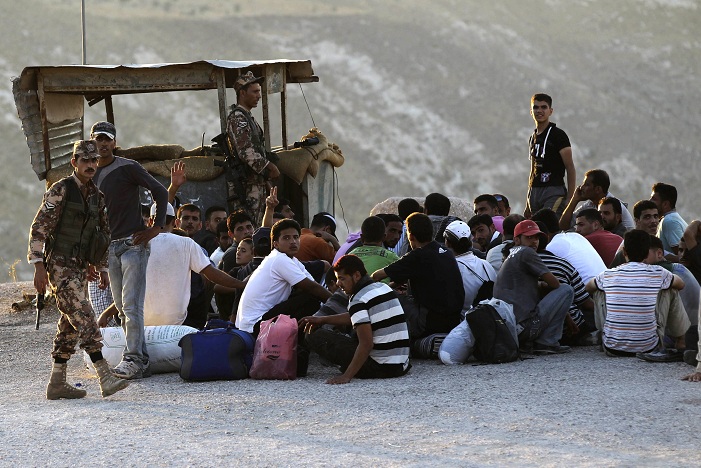Symbolist adherents are a dying breed. The days of exalting the virtues of the lover-country metaphor are over; the sinner snake and hero reborn have been buried under withering copies of ‘Golden Boughs.’ That’s not to say that cinematic symbolism isn’t valid, it’s rather more subtle complexities of living have eclipsed the black and the white.
Not so in “Argana, Hassan Rhanja’s production about the struggle of a small Moroccan village’s fight for independence in the face of greedy speculators and ruthless exploiters.
The film follows the well-trodden plot of the “return of the prodigal son, who at first tentatively, and later with proud dutifulness, fulfills the “savior of the village but not without a few ritual-esque sacrifices.
The village, located deep in the Moroccan countryside a good 250 km from civilization, i.e. the nearest hospital, has been taken over by a corrupt, sleazy (and rather unattractive) mayor – Hammour (Hamidou Benmasoud) whose sole purpose in life is to sell cheap plastic bottles and bowls and win the heart of the local vet, Nagaat, despite the fact that he refuses to pay her the 9000 DH he owes her.
Accompanied by two fawning stooges, invariably on the receiving end of his nasty temper, he isn’t too far off from the caricature evil villain; The Racoon’s Cyril Sneer comes to mind. When it comes to local elections, Hammour doles out cheap government commodities (which in fact should be free), swindling the residents.
Yet there is hope for the village: Rachid, the aforesaid returnee from abroad, and his motley crew. There’s the blind musician and his liberal young wife, the mute graduate, the disillusioned drunk, son of the legendary village hero Amghar, and his mother Tamargh, the lynchpin of the village and mother-earth.
Tattoo studded Tamargh bears a scar she received whilst defending her village against the French. Now the village is under threat by a new type of exploitation: businessmen with road and hotel designs and Hammou’s consumer products posed to rake the village of its prolific natural beauty.
In the center of the village stands the argana tree, a tough, thorny tree almost unique to Morocco. It can live longer than the resilient olive tree in near arid conditions. It’s known that oil can be produced from grinding the nut hidden in the fleshy fruits the argana bears, apparently with medicinal properties.
It is this cottage industry in which Rachid, who takes up the mantle of Amghar, mobilizes his companions and jobless women of the village. He sets up a local factory, producing Argana oil, much to the displeasure of Hammour, who’d rather macadam this treasure to the ground.
Thus the survival of the Argana is the survival of the village, its natural beauty, its community and its livelihood. As the film progresses, its gnarled, twisted roots become the film’s visual centerpiece, and its branched bowels become the site of reunions, standoffs and farewells.
This is Rhanja’s first feature film, and although it has been hailed as Morocco’s biggest box-office hit this year, it lacks the sophistication to make it worthy of modern classic status, precisely because the techniques Rhanja employes are rather too firmly placed in the modernist genre.
The film was shown as part of the Euro-Arab Film Caravan and was the highest-grossing Moroccan film this year.
Although “Argana throws us matter that resonates on a global scale – from Palestinian olive groves crushed under occupying tanks, to Sri Lankan fishing villages swept away by foreign tourist cooperations – Rhanja’s thick didacticism and heavily symbolic cardboard characters fall short of tackling the issue with any gravity.
He’s also laden his hook with too many issues, from cross-cultural love interests to the consumerist passivity; but whether through lack of cinematic time or perspicuity, he fails to do justice to any one of them.
However, in spite of its shortcomings, “Argana is certainly a moving film; the steely determination of Tamargh, played with finesse by the now Moroccan minister of culture, Touria Jabrane inspires the folkloric imagination, and her deathly swan song, tantamount to an anti-colonial battle cry are enough to stir the left leaning viewer to shed a tear or two.
Boasting a well-known troupe of Moroccan actors and some stunning rural vistas, “Argana has enough charm and quiet circumstance to render it a hit with artsy crowds. But its time for film to move on, leave the 20th century behind, and start addressing such thorny post-modern issues with the delicacy they deserve.



